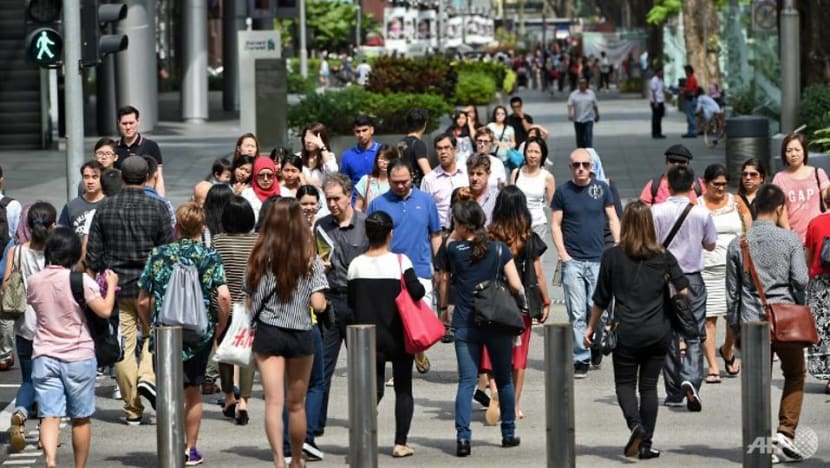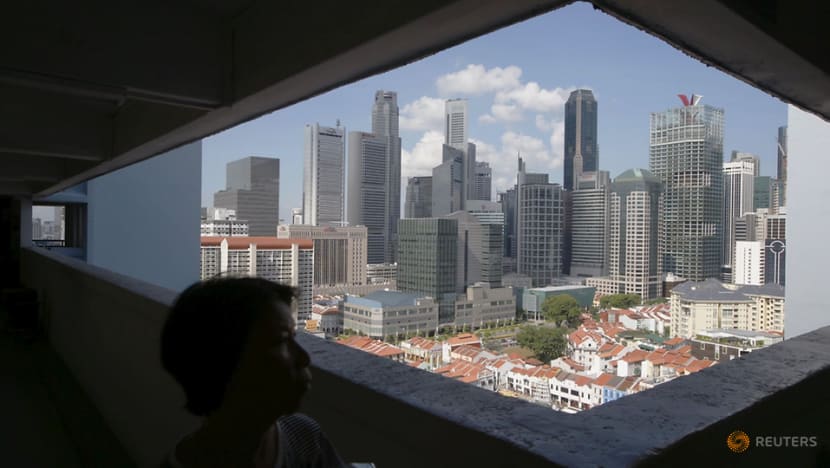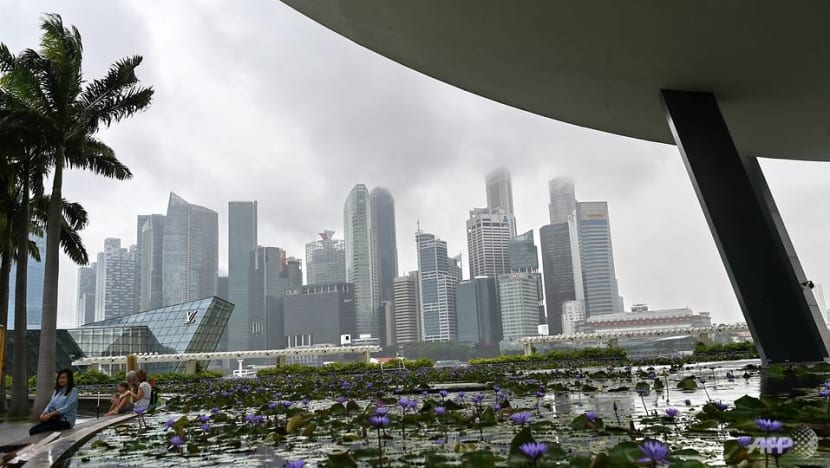commentary Commentary
Commentary: Expats, foreign talent and immigration make Singapore economically better off
Singapore would be wise to remain open to foreign talent and immigration, says a welfare economics professor.

Pedestrians cross a street at the Orchard Road shopping district in Singapore. (File photo: AFP/Roslan Rahman)
SINGAPORE: For many years, and probably more commonly expressed since the Population White Paper with its projected population of up to 6.9 million by 2030 was released in 2013, many Singaporeans have been vocal, especially online, in voicing their objection to the inflow of foreign talent and immigration.
Many Singaporeans for instance, expressed concern over the number of new citizens accepted into Singapore in 2017 announced on Thursday (Sep 27) – of slightly more than 22,000, the second highest in the last 11 years.
Yet, most are not against the inflow of foreign workers who hold lower-paid jobs that local people do not want.
Foreign talent is commonly perceived to be the key culprit taking away good jobs that could be filled by local Singaporeans, and hence deemed undesirable. Immigration creates concerns that Singapore will be more crowded and less livable.
Is this really the case?
MISPERCEPTIONS ABOUT FOREIGN TALENT
The inflow of foreign talent and immigration involve also the consideration of non-economic aspects like social harmony that I will not discuss in this commentary due to limitations of space and expertise.
Nevertheless, the economic effects considered here is a, if not the, major factor accounting for the misperception of the undesirability of foreign talent.
One reason for the misperception is because the replacement effect of local talent by foreign talent is direct, immediate, and visible - while the benefits of getting the best, even if foreign, talent are indirect, long-run, and less visible.

If an opening of a professorship is filled up by a foreigner, then obviously, where relevant, a local applicant misses out on this position.
At NTU, we have a policy of preferring a local applicant if their qualifications are comparable. We appoint a foreign applicant only with clear superiority – a general inclination I imagine many other universities and countries share.
I also support this policy of a slight preference for local talent on the grounds of the added costs of settling in and adapting to a new country for a foreign professor. However, this preference should not be large, else we would miss out on high-quality talent and lag behind internationally.
READ: Why do companies still hire expat staff even though they seem to cost more? A commentary
READ: Expats have an edge over locals. Here's why, a commentary
ADVERSE EFFECTS IF WE SHY AWAY FROM FOREIGN TALENT
Imagine that, back in 1965, if we were to adopt a policy of not appointing foreign applicants, then by now in 2018, we would have virtually all of our top jobs occupied by Singaporeans only.
However, we would almost certainly be a much more backward country with all, including top jobs, paying much less than half those of the current levels.
This would be the case if, for instance, we lose 1.5 per cent of GDP growth each year over 53 years – a back-of-the-envelope estimate which is not unreasonable when you consider that the real GDP per capital of Singapore since independence grew at an average annual compounded rate of about 5 per cent.
Almost certainly, if a no-foreign-talent policy were pursued instead, Singapore’s average growth rate would be less than half of this.
Perhaps only about half of the current occupants of these top jobs are Singaporeans. Yet almost all Singaporeans still have jobs – and many earn more than twice as much compared to a under a no-foreign-talent scenario.

Indeed, the already low 2 to 3 per cent unemployment rate now is unlikely to be lower in a no-foreign-talent policy scenario.
In fact, without our ability to attract foreign investment and talent, including the multinational corporations that bring their people to set up shop here and rely on this foreign talent, the economy would be less efficient and vibrant, and hence likely to have a higher unemployment rate.
In other words, at least in the long run, most if not all Singaporeans will be much better off if the open and outward-looking manpower policy that views foreign talent favourably which the Singapore Government has pursued over the last 50 years or so remains.
And we would be wise not to tighten foreign manpower inflow and immigration excessively, just because some people fail to see the long-run benefits of an economic model that is open and efficient. Yet, as reported on Sep 27, the number of foreigners employed in Singapore continued to decline over 2017, after a big drop over 2016.
Many people also believe that immigration reduces the salaries of locals and increases unemployment, and hence make them worse off economically. In fact, serious economic studies show overwhelmingly that the reverse is true.
Immigrants bring in factors complementary to the local ones and make the economy more vibrant. Recently published studies of 20 OECD economies over 20 years by human capital and economic growth expert Michal Burzynski and labour economist Frederic Docquier have shown that the long-run employment, wage and income effects on locals are all positive, contrary to popular misperceptions.

READ: A leading chipmaker's expansion here and what it means for Singapore, a commentary
THE FALLACY OF ANTI-FOREIGN TALENT SENTIMENTS
Several fallacies are behind such misperceptions.
First, that foreign talent pushes up property prices. Although foreign talent might increase demand for property, goods and services, their consumption drives a vibrant, stable market and is tempered by government restrictions on foreign ownership of residential properties.
A second fallacy is that immigration increases congestion and pollution over time. When driving in a congested road or in a crowded bus or train, one is tempted to think, if the number of cars or commuters can be halved, I can move around more freely.
This is a mistake because the logic is based on the invalid assumption that the width of the road and the number of buses or trains is given. However, given the amount of taxes each person has to pay, if the number of taxpayers were fewer, we would have narrower roads and fewer buses and trains. Congestion would likely be worse.
In 1965 when Singapore had less than a third of its population now, I was studying at the old Nanyang University. When we missed the only bus from the campus to the city then, we had to wait the full half-an-hour.
Now, at the NTU campus at the same location, even if one misses two buses in a row, typically the third one arrives within 5 minutes. Development, a better endowed university, along with a higher density of people have led to better services.

A LARGER POPULATION ISN’T A BAD THING
The advantages of a larger population typically more than offset the costs. People in larger cities earn more, have better amenities, and travel more conveniently than people in the country side or even smaller towns. They also contribute to a larger built-up area in the city centre.
Given two similar jobs, most people prefer the one in a larger city. As often reported, medical practices in small towns have difficulties attracting medical doctors to work there despite offering double the amount of salary.
Yet, when it comes to immigration, people complain that the population size is already too big. Isn’t this rather paradoxical?
It is true that if we do not have efficient policies and not keep up investment in infrastructure, a larger population may lead to excessive congestion and pollution.
However, if we correctly impose taxes on these external costs (including through taxes on petrol consumption), foreign talent and immigration make Singapore better off. Taxes collected, including income taxes levied on tax residents, could be used to provide better amenities.

A larger population also makes Singaporeans better off by spreading out the large costs of providing public goods like defence, broadcasting, and research. This factor is particularly important for a small country like Singapore.
If we look at the source countries of the foreign talent we received in recent years, we also see that there is a healthy mixture of talent from Australia, China, India, the UK and the US. If social harmony cannot be maintained, the economic benefits of immigration may be more than offset by the social costs.
Over the decades, Singapore has been very open to foreign talent and immigration to augment itself, and even with a diverse mix of talent from many different countries, has been able to maintain a very high level of harmony.
This would be made even more so, if Singaporeans understand that much of the anti-foreign talent sentiment is based on fallacies discussed above.
Ng Yew Kwang is Professor of Economics at the Nanyang Technological University.















